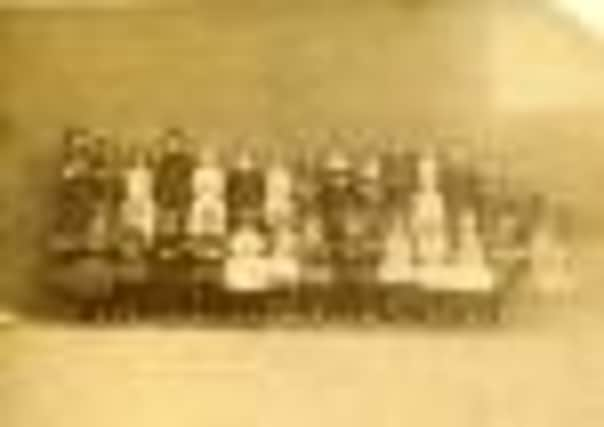Working for pocket money taught us a valuable lesson


We spoil them I think because when we were children, we got so little and we don’t want them to go without.
But if we’re honest we didn’t really suffer as a result of going without because it taught us self-reliance, independence, and learning how to manage on very little.
Advertisement
Hide AdAdvertisement
Hide AdNothing was ever handed to us on a plate and we soon learned that if you want anything you’ve got to work for it. At least in those days you had to.
If we wanted pocket money for the pictures we had to earn it by doing odd jobs like delivering newspapers, washing neighbours’ flags, chopping firewood or going potato picking.
What a vast improvement there would be to family life if we could teach such honest, down-to-earth values to our children which my generation learned at our mother’s knee.
Like most children at that time, I grew up knowing I had to help in the house and I continued doing that right up to the day I got married.
Advertisement
Hide AdAdvertisement
Hide AdEveryone in our house had their jobs to do and there were few grumbles, except when we started courting and wanted to go out at night with boyfriends.
My job was cleaning the cellar steps and the outside lavatory, and my mother also volunteered me to do the same for elderly neighbours, including running their errands.
Sometimes they’d give me a penny or two but if my mother found out she always made me take it back. This was how we learned to do things for nothing.
We looked after the elderly and the sick up our street, and I can never remember grumbling about doing little jobs for them because they were always so grateful.
Advertisement
Hide AdAdvertisement
Hide AdMy mother joined weekly clubs, clothes clubs, holiday fund clubs shoe clubs and Christmas Clubs because working people didn’t have cheque books, and certainly no credit cards.
Children were encouraged to join the school saving’s bank at an early age even if it was only a penny they could afford to deposit.
No wonder I’ve stayed all my life with the bank which ran our school saving’s bank, known in those days as the Yorkshire Penny Bank.
And I still call it by that name even though some years ago they decided to drop the word Penny from their title.
Advertisement
Hide AdAdvertisement
Hide AdThe other day I was reminded of my old school bank days when I read an article in an old Reporter file about a lecture given on thrift in Dewsbury Town Hall.
It was given in 1922 by a manager of Yorkshire Penny Bank who was urging people to start saving for a rainy day. And he felt that thrift should be an integral part of the school curriculum and children should be taught its value from an early age.
If thrift was taught in the most fertile period of a person’s life – childhood – it would become an integral part of their character.
In mature years it would enable them to resist the temptation to waste or squander and could relieve the anxiety and lighten the burden of old age.
Advertisement
Hide AdAdvertisement
Hide AdThe opportunities to save were many and included commercial banks, savings banks, the Post Office, building societies, Co-operative societies and other kindred institutions. He added: “There are also the Friendly Societies, whose beneficent work in their early days was far-reaching and whose usefulness is still of the greatest value to large numbers of people.
“I would also mention clothing clubs, sick clubs, coal clubs and many more, membership of which involves self-denial today so as to provide benefits later.
“Life assurance is another important branch of thrift, and National Health Insurance, now State-funded and compulsory, is another medium, and a direct recognition of the absolute necessity of thrift for the well-being of the community.
“Lastly I would mention war savings associations, which now abound on every hand, and which speak for themselves.”
Advertisement
Hide AdAdvertisement
Hide AdIt may interest readers to know that the school banking system was introduced to Yorkshire in 1874 but didn’t meet with any great success until the passing of the Free Education Act in 1891.
It was then that the value of school banks began to be recognised and parents who had previously been forced to pay school fees for their children’s education, decided to take advantage of the school bank scheme.
The school banking system continued to grow. In Yorkshire alone between 1891 to 1922 schoolchildren made 67 million deposits into the Yorkshire Penny Bank.
In Dewsbury, where there were 17 school banks, upwards of 900,000 deposits were made.
Advertisement
Hide AdAdvertisement
Hide AdThe North of England, despite suffering many serious recessions, was one of the leaders in the growth of the school banking movement.
Whether or not the habit of thrift is taught in Dewsbury schools these days, I have no idea, but for the sake of the children, I hope it is.
l I received a letter this week from Mrs Wilson, who lives in Thornhill, which will add further to the speculation about what is the name of the street on The Flatts pictured the other week.
It showed a lady sweeping her flags, and there was a motor bike in the background.
Advertisement
Hide AdAdvertisement
Hide AdMrs Wilson writes: “My husband seems to think the street may be Back Belgrave Street as his grandma lived in that area for a number of years.
“Also the motor bike pictured used to belong to us from 1951-1955. It was a 250cc Panther and we bought it just after we were married. We rode it up and down the country every weekend, but we cannot remember who bought it from us.”